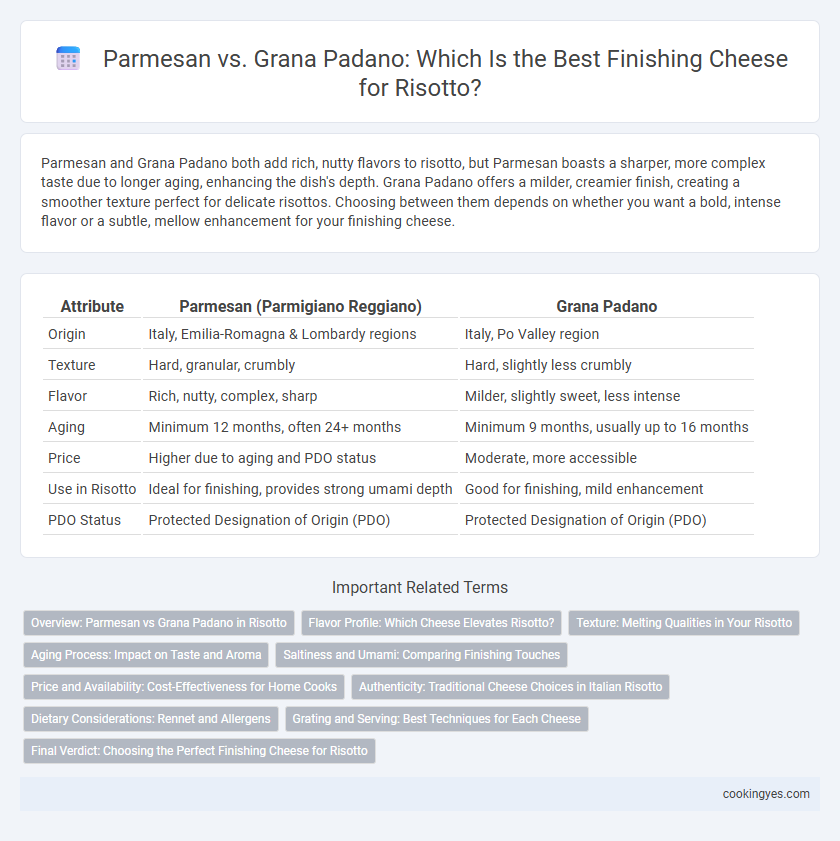Parmesan and Grana Padano both add rich, nutty flavors to risotto, but Parmesan boasts a sharper, more complex taste due to longer aging, enhancing the dish's depth. Grana Padano offers a milder, creamier finish, creating a smoother texture perfect for delicate risottos. Choosing between them depends on whether you want a bold, intense flavor or a subtle, mellow enhancement for your finishing cheese.
Table of Comparison
| Attribute | Parmesan (Parmigiano Reggiano) | Grana Padano |
|---|---|---|
| Origin | Italy, Emilia-Romagna & Lombardy regions | Italy, Po Valley region |
| Texture | Hard, granular, crumbly | Hard, slightly less crumbly |
| Flavor | Rich, nutty, complex, sharp | Milder, slightly sweet, less intense |
| Aging | Minimum 12 months, often 24+ months | Minimum 9 months, usually up to 16 months |
| Price | Higher due to aging and PDO status | Moderate, more accessible |
| Use in Risotto | Ideal for finishing, provides strong umami depth | Good for finishing, mild enhancement |
| PDO Status | Protected Designation of Origin (PDO) | Protected Designation of Origin (PDO) |
Overview: Parmesan vs Grana Padano in Risotto
Parmesan and Grana Padano both enhance risotto with their rich, umami flavors but differ in aging and texture, influencing the final dish's depth. Parmesan, aged longer (12-36 months), offers a more complex, nuttier taste and granular texture, perfect for finishing risottos with intense flavor profiles. Grana Padano, aged 9-20 months, has a milder, creamier taste and softer texture, making it ideal for a subtler, smoother risotto finish.
Flavor Profile: Which Cheese Elevates Risotto?
Parmesan, aged longer and with a more complex umami flavor, provides a sharper, nuttier finish that enhances the depth of risotto. Grana Padano offers a milder, creamier taste with subtle grassy notes, balancing richness without overpowering delicate ingredients. The choice depends on whether a bold, intense flavor or a smoother, more nuanced finish is desired to elevate the dish.
Texture: Melting Qualities in Your Risotto
Parmesan cheese offers a granular texture that melts smoothly, creating a creamy finish ideal for risotto. Grana Padano has a slightly softer texture with a more elastic melt, allowing it to blend seamlessly without overpowering the dish. Choosing between Parmesan and Grana Padano depends on the desired creaminess and subtlety in the risotto's final texture.
Aging Process: Impact on Taste and Aroma
Parmesan, aged for a minimum of 12 months, develops a complex, nutty flavor with sharp umami notes that intensify as it matures, making it ideal for imparting depth to risotto. Grana Padano undergoes shorter aging, typically 9 to 16 months, resulting in a milder, creamier taste with subtle fruity undertones that enhance the risotto's delicate texture without overpowering it. The aging process directly influences the cheese's crystalline texture and aromatic profile, affecting the final risotto's richness and mouthfeel.
Saltiness and Umami: Comparing Finishing Touches
Parmesan offers a pronounced salty and rich umami flavor, enhancing risotto with its deep savory notes and slightly granular texture. Grana Padano provides a milder saltiness and a creamy umami profile, resulting in a subtler finish that lets the risotto's ingredients shine. Choosing Parmesan intensifies bold flavors while Grana Padano creates a balanced, smooth finish.
Price and Availability: Cost-Effectiveness for Home Cooks
Grana Padano offers a more cost-effective alternative to Parmesan for finishing risotto, with a lower price point that suits home cooks seeking quality without overspending. Widely available in supermarkets and specialty stores, Grana Padano provides similar nutty and creamy flavors, enhancing risotto while remaining budget-friendly. Parmesan tends to be pricier and less accessible, making Grana Padano the preferred choice for affordable yet authentic Italian cooking.
Authenticity: Traditional Cheese Choices in Italian Risotto
Parmesan, or Parmigiano-Reggiano, is the traditional finishing cheese in authentic Italian risotto, prized for its complex umami flavor and granular texture that enhances the dish's creaminess. Grana Padano, while similar, is a milder, less aged cheese often used as a more affordable alternative but lacks the depth and aging standards that define true Parmigiano-Reggiano. For an authentic risotto experience, Parmesan remains the preferred choice, aligning with regional Italian culinary traditions and protected designation of origin (PDO) standards.
Dietary Considerations: Rennet and Allergens
Parmesan typically uses traditional animal rennet, which may not be suitable for vegetarians, while Grana Padano can contain either animal or microbial rennet, offering more flexibility for dietary preferences. Both cheeses are aged and naturally lactose-free, reducing allergen concerns for lactose-intolerant individuals. It's essential to check specific product labels for rennet source and potential allergens to accommodate dietary restrictions in risotto preparation.
Grating and Serving: Best Techniques for Each Cheese
Grana Padano and Parmesan both excel when finely grated over risotto, but Grana Padano's slightly softer texture allows for easier grating and melts more uniformly into the dish. Parmesan, with its granular consistency, benefits from using a microplane grater to achieve delicate, fluffy shavings that enhance risotto's texture without overpowering. Serving Grana Padano freshly grated immediately before plating preserves its creamy flavor, while Parmesan's robust taste holds up well even if grated slightly ahead of time.
Final Verdict: Choosing the Perfect Finishing Cheese for Risotto
Parmesan and Grana Padano both offer creamy, nutty flavors that enhance risotto, but Parmesan's more intense, aged profile provides a richer depth ideal for finishing. Grana Padano, with its milder, slightly sweeter taste and lower salt content, suits those seeking a subtler cheese that melds smoothly without overpowering. For the perfect finishing cheese, Parmesan stands out in traditional recipes, while Grana Padano works well in milder, lighter risottos.
Parmesan vs Grana Padano for finishing cheese Infographic

 cookingyes.com
cookingyes.com